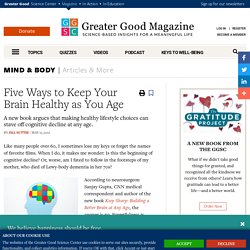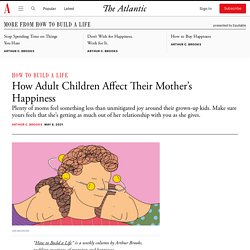

We Want to Have Deeper Conversations With Strangers…. How to Get Through the Holidays After Loss. A young woman in Toronto who recently lost her father will be wearing his Santa hat on Christmas.

Another New York Times reader, newly divorced, says she will spend the holiday hiking up a mountain. And a reader in Long Beach, Calif., says each holiday he makes a full meal, even if he’s alone — and then has pie for breakfast. Holidays can bring all sorts of pain after a loss or another kind of family disruption. What do I say to my estranged daughter after years apart? The question My youngest daughter has ignored me since I divorced her mother some years ago.

She didn’t even visit when I suffered from cancer and had chemotherapy. When she got married, my partner and I were not allowed to attend. I’ve never met her child, yet her husband’s father, who is in the same situation as me, widowed with a new partner, is allowed to visit and see my grandchild. I also have a married son with children and they all are fine with me and my partner. Now, before my elderly mother’s birthday, she says I can visit her so that the party won’t be the first time we meet again. If I was a bad dad, I could probably understand it, but growing up they were short of nothing. Self-handicapping: when we avoid effort to protect our self-esteem. What Helpful Rats Can Teach Us About Humanity. A decade after scientists discovered that lab rats will rescue a fellow rat in distress, but not a rat they consider an outsider, new UC Berkeley research pinpoints the brain regions that drive rats to prioritize their nearest and dearest in times of crisis.

It also suggests humans may share the same neural bias. © Inbal Ben-Ami Bartal The findings, published in the journal eLife, suggest that altruism, whether in rodents or humans, is motivated by social bonding and familiarity rather than sympathy or guilt. “We have found that the group identity of the distressed rat dramatically influences the neural response and decision to help, revealing the biological mechanism of in-group bias,” said study senior author Daniela Kaufer, a professor of neuroscience and integrative biology at UC Berkeley. Bartal launched the study in 2014 as a postdoctoral Miller fellow in Kaufer’s laboratory at UC Berkeley. How to Be Happy - Well Guides. How Power Corrupts Your Instinct for Cooperation. Emiliana Simon-Thomas is the science director of the Greater Good Science Center, where she co-teaches The Science of Happiness, a free, eight-week online course that “explores the roots of a happy, meaningful life.”

She earned her Ph.D. in psychology from UC Berkeley in 2004, studying how emotional and cognitive processes interact to shape behavior and brain activity. In the interview below, Simon-Thomas talks about how humans are a collective species that thrives on collaboration. Five Ways to Keep Your Brain Healthy as You Age. Like many people over 60, I sometimes lose my keys or forget the names of favorite films.

When I do, it makes me wonder: Is this the beginning of cognitive decline? Or, worse, am I fated to follow in the footsteps of my mother, who died of Lewy-body dementia in her 70s? According to neurosurgeon Sanjay Gupta, CNN medical correspondent and author of the new book Keep Sharp: Building a Better Brain at Any Age, the answer is no. 3 Ways to Make Your Mom Happier on Mother's Day. At the most obvious level, adult children can lower their mother’s resentment and stress by decreasing their financial dependence, which has been repeatedly found to be a significant source of family conflict.

Some researchers estimate that adult children are nearly four times as likely to receive financial support from their parents as vice versa. In many cases, independence is simply not possible, especially given unstable job markets and the skyrocketing costs of city life. If nothing else is feasible, start with a small gesture, like taking your cellphone off the family plan. The Psychology of the Silent Treatment.
“My research suggests that two in three individuals have used the silent treatment against someone else; even more have had it done to them,” Williams said.

Experts told me that although they need more data to know for certain, instances of the silent treatment have likely increased over the years as new forms of communication have been invented. “Every new method of connection can be used as a form of disconnection,” Williams said. Ostracism can also manifest in lesser ways: someone walking out of the room in the middle of a conversation, a friend at school looking the other way when you wave at them, or a person addressing comments from everyone in a message thread except you.
“Partial ostracism,” Williams told me, might mean monosyllabic replies—a terse period at the end of a one-word text message. 10 Pillars of a Strong Relationship. Your performance evaluation at work comes in, and it’s glowing.

However, there’s one area that “needs improvement.” Days later, which part do you think about? The negative, of course. How a 'beginners’ mindset' can help you learn anything - BBC Worklife. Why Parents and Kids Get Estranged. Read: Dear Therapist: My daughter hasn’t wanted a relationship with me for 25 years However they arrive at estrangement, parents and adult children seem to be looking at the past and present through very different eyes.

Estranged parents often tell me that their adult child is rewriting the history of their childhood, accusing them of things they didn’t do, and/or failing to acknowledge the ways in which the parent demonstrated their love and commitment. Adult children frequently say the parent is gaslighting them by not acknowledging the harm they caused or are still causing, failing to respect their boundaries, and/or being unwilling to accept the adult child’s requirements for a healthy relationship.
Both sides often fail to recognize how profoundly the rules of family life have changed over the past half century. Dear Therapist: Should I Financially Support My Struggling Children? Your daughter probably takes to Twitter to express her anger because she feels that when she goes directly to you, she isn’t being heard.

Similarly, your perception that you “say nothing of consequence” when you see your son yet “have a pleasant-enough time” might indicate that you aren’t aware of how he’s truly feeling either. With so much anger (on his part) and anxiety (on yours and your husband’s) roiling beneath the surface, these interactions sound at best hollow and superficial, and at worst emotionally torturous. Is time spent together really “pleasant enough” when he knows that you’re disappointed with his career, his partner, and his weight, and find his life to be sad?
If you don’t start having conversations of consequence, you’ll indeed maintain the status quo, which sounds unhealthy for everyone. Review: ‘Work,’ by James Suzman. Work, Suzman observes, is what distinguishes animate organisms, humans above all, from inert matter: “Only living things actively seek out and capture energy specifically to live, to grow and to reproduce.” Yet it is the million-year history of labor’s counterpoint, leisure, that holds the key to humanity’s exceptionalism—its record of remarkable progress, and the discontent that seems to have accompanied those strides. From what we can tell, our Australopithecus ancestors of roughly 2.5 million years ago closely resembled modern primates, such as chimpanzees, who spend about eight hours a day foraging and eating. Dear Therapist: My Daughter and Her Husband Take Us for Granted.
Our daughter gets very defensive of her husband, and we have virtually no relationship with him directly because he only stays in the room with us if she’s there or if he’s doing something directly for the kids. If the three of us are talking, he checks out of the conversation and gets on his phone. Dear Therapist: Can I Ever Mend My Relationship With My Mom? All I want is to be able to have a relationship with her, especially now that I will be going through a major life milestone, and ideally other milestones after that such as having kids.
My father (who has been divorced from her for 24 years), my fiancé, and I are paying for the wedding, so I don’t have to include her in the planning. I just want to, because that’s what other mothers and daughters do. I fear that during the stress of wedding planning she will be unable to keep from spiraling out of control if there is any type of snapping, losing one’s cool, or disagreement on my end. She has expressed that she felt left out when my brother and sister-in-law were planning their wedding, so I am trying to include her. Five Science-Backed Strategies to Build Resilience. Oliver Burkeman's last column: the eight secrets to a (fairly) fulfilled life. Eight Ways Your Perception of Reality Is Skewed. Can you teach mental toughness?
Mental toughness has become one of the most common phrases in learning and development, frequently used but often without context. Professor Peter Clough from Huddersfield University looks at how organisations can build resilient workers who can prosper under pressure, and believes challenges should be viewed as opportunities, not threats. – barbaragrieve
How Do I Reconcile With My Adult Daughter? My Adult Child Won't Talk to Me. I'm Tired of Dealing With My Sister's Complaints. How Can I Set Boundaries at Home With My Adult Daughter? Dear Therapist: My Daughter Lives Too Far From Me. The mindset you need to succeed at every goal - BBC Worklife. Previous research had demonstrated the importance of metacognition in isolated disciplines – but Chen wondered whether there might be some more general patterns across different domains. Are some people simply more inclined to apply metacognitive strategies in whatever goal they set out to achieve?
Strategic mindset. Bridging Differences Playbook Final. How Your Social Life Might Help You Live Longer. When you think of healthy habits, what sorts of things come to mind? Eating a balanced diet with plenty of fruits and vegetables? What Neuroscience Can Teach Us About Aging Better. The Role of Cognitive Dissonance in the Pandemic. Why your ‘weak-tie’ friendships may mean more than you think - BBC Worklife. The medications that change who we are - BBC Future. Smarter COVID-19 Decision-Making. What is Ambiguity Aversion? Encouraging Health Behavior Change: Eight Evidence-Based Strategies. Behavior Change Strategies. Why is changing health related behaviour hard.
Discussions about behaviour change are subject to six common errors: It's just common sense It's about getting the message across Knowledge and information drive behaviours People act rationally People act irrationally It is possible to predict accurately – barbaragrieve
8 Reasons Why It's so Hard to Really Change Your Behavior. Lessons from Dunning-Kruger.